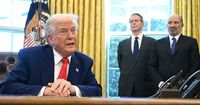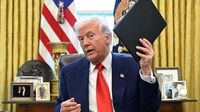United States President Donald Trump made headlines on April 9, 2025, when he abruptly paused stiff reciprocal tariffs for a period of 90 days, a move that has sparked allegations of market manipulation from various lawmakers. The announcement of the tariff suspension came just hours after Trump encouraged his followers on social media to invest in stocks, a sequence of events that has raised eyebrows among Democrats and financial experts alike.
On the morning of April 9, Trump started his day with a reassuring message on Truth Social, stating, "BE COOL! Everything is going to work out well." Shortly thereafter, he posted, "THIS IS A GREAT TIME TO BUY!!! DJT," referencing the stock symbol for his company, Trump Media & Technology Group. This tweet was followed by the announcement of the 90-day pause on tariffs, citing negotiations with at least 75 countries willing to discuss trade deals with the U.S.
The Democrats’ House Committee on Financial Services quickly condemned Trump's actions, asserting that the President was engaging in "the world’s biggest market manipulation scheme." This statement was fueled by a now-infamous video posted by White House aide Margo Martin, where Trump claimed, "He made $2.5 billion today, and he made $900 million. That’s not bad," while pointing to Charles Schwab, the founder of Schwab asset management.
US Trade Representative Jamieson Greer defended Trump’s actions during a House testimony, asserting, "It’s not market manipulation. We are trying to reset the global trading system." However, his defense was met with skepticism from Democratic Representative Steven Harsford, who challenged Greer on the implications of the tariff suspension. "If you came here knowing that these tariffs were going to be turned off, why didn’t you include that in your opening statement?" Harsford pressed.
Harsford's inquiries did not stop there. He questioned, "If this was always the plan, how is this not market manipulation? Who’s benefiting? What billionaire just got richer?" Such concerns were echoed by California Democratic Senator Adam Schiff, who announced the initiation of a formal investigation into whether members of Trump's administration illegally profited from the stock market fluctuations triggered by the tariff announcement.
Schiff's probing questions included, "Who in the administration knew about Trump’s latest tariff flip-flop ahead of time? Did anyone buy or sell stocks, and profit at the public’s expense?" In a statement on social media, he expressed the need for transparency, emphasizing that the public has a right to know about potential insider trading.
The White House, however, has dismissed these allegations as unfounded. A spokesperson stated, "It is the responsibility of the President of the United States to reassure the markets and Americans about their economic security in the face of nonstop media fearmongering." This sentiment was echoed by Treasury Secretary Scott Bessent, who suggested that the tariff pause was part of a larger strategy all along.
Trump himself acknowledged the market's volatility, admitting that people were getting "yippy" and "afraid" and that his decisions were driven by instinct rather than a calculated strategy. This admission has not alleviated concerns from critics who argue that Trump's behavior may have crossed ethical lines.
The timing of Trump's social media posts and his subsequent tariff announcement coincided with a remarkable recovery in the stock market. Following the announcement of the tariff suspension, the Dow Jones index surged by 7.87 percent, marking its most significant gain since 2008. The Nasdaq also saw a substantial increase, climbing 12.16 percent, the largest rise since 2001. Shares of Trump Media & Technology Group closed the day up 21.67 percent.
In light of these developments, former White House ethics lawyer Richard Painter remarked that there could be grounds for an investigation. "Presidents are not investment advisors," Painter stated, suggesting that the circumstances surrounding Trump's actions could expose him to charges of market manipulation. His perspective adds another layer of scrutiny to an already controversial situation.
As the political landscape continues to evolve, the implications of Trump’s tariff pause and the surrounding allegations of market manipulation remain a hot topic among lawmakers and financial analysts alike. The situation is further complicated by the broader context of Trump's presidency, characterized by a series of unpredictable economic policies and social media engagements.
The fallout from this incident may have lasting effects on public trust in the administration and the integrity of the financial markets. As investigations proceed, many are left wondering what this means for the future of economic policy in the United States and whether accountability will be enforced for those in power.
In the coming days, all eyes will be on the ongoing investigations initiated by Senator Schiff and others, as they seek to uncover the truth behind the timing of Trump's announcements and the potential for insider trading among members of his administration. The outcome of these inquiries could set significant precedents for how financial ethics are upheld in the highest offices of the land.





